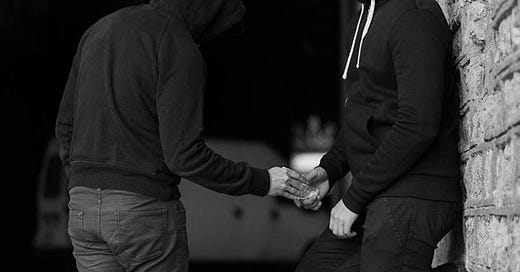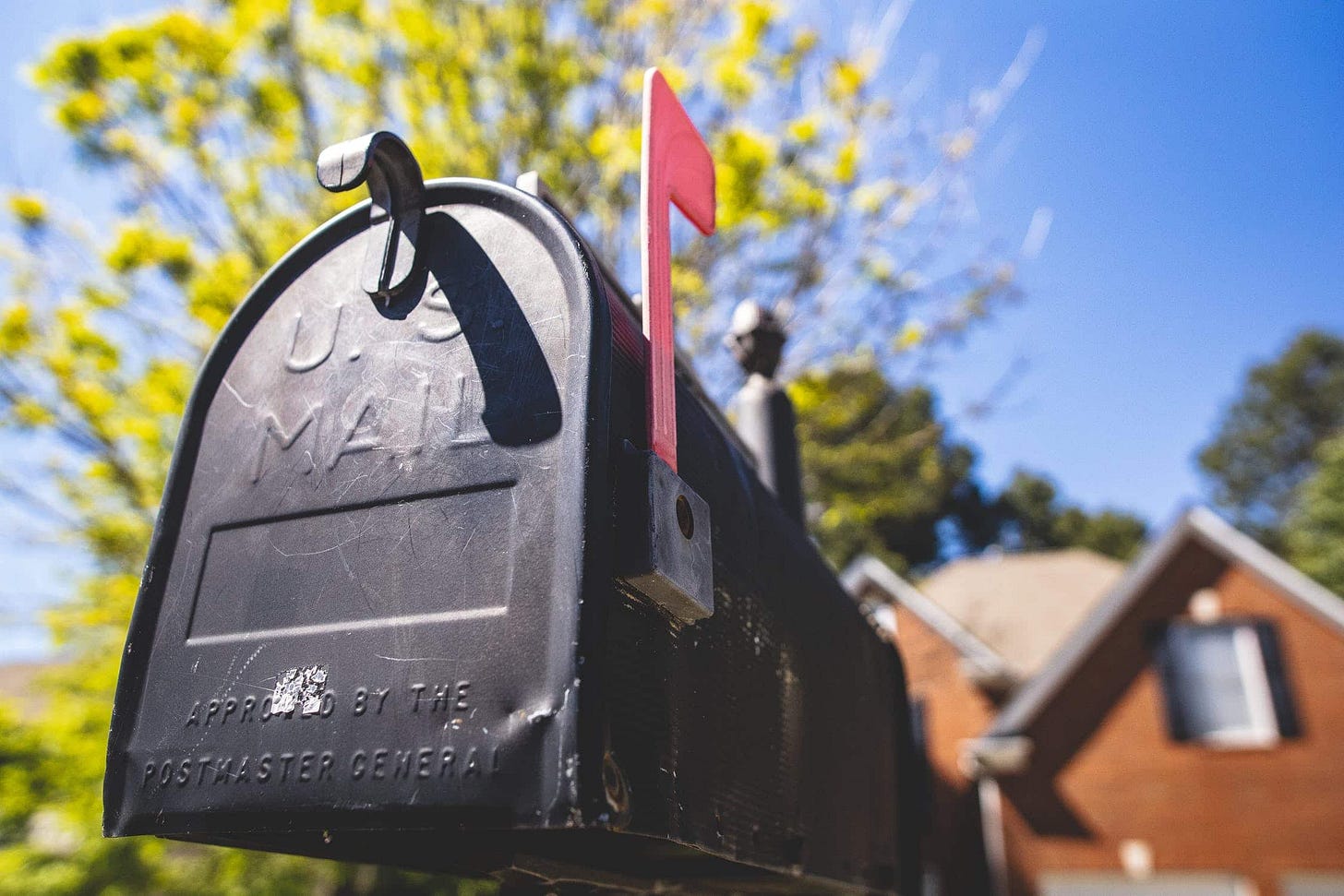People "Just Wanted To Keep Partying": Drug Trafficking During the Pandemic
Once people were out of work—and locked down at home—the demand for drugs skyrocketed
Covid caused unprecedented stress for people around the US, and with that stress came increased substance use.
I wanted to know more, so I talked to dealers, users, advocates, and experts about how lockdown and a global pandemic affected the illegal drug industry.
Here's what they told me.
This is the first of three articles.
Unless a full name is given, a pseudonym is being used.
Higher consumption
Demand for drugs increased during the pandemic. The CDC in an August 2020 study reported that the psychological toll of the pandemic led to 13.3% of respondents either starting or increasing substance use due to the mental health stress of dealing with the pandemic.
Sheila Vakharia of the Drug Policy Alliance, who is deputy director of the alliance's Department of Research and Academic Engagement, told me that while data from the last year is still coming out, there are indications that the unique stress of the isolation and uncertainty of lockdowns and the disease's spread contributed to an increase of substance use across the board.
"There was some research to suggest, for instance, that alcohol sales had increased towards the beginning of the pandemic and people were reporting self-medicating with more drugs or using more drugs because they were alone," said Vakharia.
Higher consumption meant a higher demand for product. And Dion, Ben, and Scott—three dealers I spoke to—were ready to step in.
"Everything was pretty dialed in"
Dion, who used to deal cannabis on California's black market, said that when the pandemic hit he was in a comfortable place with the business.
After working as a street level dealer over a decade ago on the East Coast, the most important asset Dion had developed was the trust of his suppliers. That took years of proving he could handle weight and distribution.
"Having credit is a big thing in this industry," Dion explained. "So that was a big thing for me, having the loyalty and the respect that people would front me hundreds of thousands of dollars worth of product."
Most of the product Dion handled went from the West Coast to the East Coast by truck or by mail. His role was to ensure people on both ends of the transaction were in touch and where they needed to be when they needed to be there—connecting suppliers and dealers and making sure the product is delivered in a safe and timely manner.
"I didn't want to be directly touching anything that I didn't have to." Dion told me.
The business was mostly "phone calls and then pickups and drop offs and driving," Dion told me—nothing more intense.
"No one really starts with guns in this part of the industry," Dion said. "Definitely at the bigger levels people that are always strapped."
People were bored and wanted to get high
Once people were out of work—and locked down at home—the demand for product skyrocketed. Stringent lockdowns kept most people inside. But not everything was shut down. The mail kept being delivered, and that provided an opportunity as people started using the postal service for online shopping delivery.
"The mail got crazier, so it just made it easier for shipments to make it," Dion said.
Business boomed at the street level as well.
For Ben, a cannabis, mushrooms, and acid distributor in the Great Lakes region, the pandemic accelerated what was a solid part-time job. He recently moved back to his home area—where he has the best connections—and has been dealing in the region and around the country.
When the pandemic hit, Ben told me, people were bored and wanted to get high. That led to a booming market for edibles for people who didn't normally buy drugs.
"I was delivering in the mail boxes of nurses and lawyers and overachievers and all kinds of A-students that don't know how to get weed otherwise," Ben said.
"A lot of them just wanted to keep partying"
Like Ben, Scott mostly deals on the side. Scott, who lives in the Northeast and works in the landscaping field, sells cannabis on the black market—he lives in a state where there’s a legal weed industry—as well as mushrooms, acid, and MDMA.
When the pandemic hit, Scott found that his customers weren’t exactly shutting down their lifestyle. With a month or two of lockdown, he had doubled his business.
"A lot of them just wanted to keep partying and whatnot," Scott told me.
Scott used a curbside delivery method. He would drop product off in mailboxes, especially during the height of the pandemic and when dealing with the older end of his clientele.
"What they would do is drop money in the mailbox and text me," Scott said. "Then when I got there, I would just drop [the product] in the mailbox, take the money and then dip out."
Ben also used mailboxes for curbside delivery, and found that the impersonal deliveries ended the necessary social aspect of dealing.
"It made it easier than hanging out or sticking around and all that stuff," Ben said.
The post office was useful in a more traditional way, too—Ben sent acid by mail to customers around the country as demand for the powerful psychedelic spiked.
"You can wrap it in foil and put it in the back of a sticker or something and just put it right in an envelope," Ben said. "I did mail a lot of acid to people. I know that definitely took off during the quarantine."
The cops
Police didn't seem to go after cannabis more than before, said Dion, though he noted that due to lower interstate traffic trucks were busted at a slightly higher rate. But that seemed more of an example of the police acting on opportunity than looking for people.
Ben told me that he has seen a drop in arrests over the past 16 months. But he cautioned that number be taken with a grain of salt—the slowdown in street level busts in his area is due in part to the lack of nightlife that would normally provide police with an easier pretext for busts.
The Drug Policy Alliance has seen prosecutions and busts go down, Vakharia said. She suggested that could be because of a push on the part of authorities to de-prioritize certain offenses in the pursuit of a "focus on public order or so-called public safety enforcement." The numbers for 2020 still haven't been released, so the group doesn't know exactly how that played out in practice.
"What I can say anecdotally from communities across the country was that we were getting the message from law enforcement and prosecutors that drug related offenses, for the most part, were being deprioritized in the midst of all of the year, during the quarantining, the lockdown, and the shut down measures," Vakharia told me.
"Sales will be good"
With the boom in business from the pandemic, though, came increased competition as more people re-entered the game—for many as a way to supplement income as job losses and unemployment insurance combined to make a tenuous situation even more uncertain.
"It got really, really flooded and prices got really competitive," Dion said.
Maria Guido, a social worker in Pittsburgh who works primarily with at-risk children and adolescents, told me that she has seen an increase in people getting into distribution since the pandemic began. While Guido had always seen people dabbling in the drug game for a little extra money on the side or turning to the market when things got tough, the economic collapse that came with Covid was unique.
"If you couldn't get any assistance during that time, you had to find a way to get money," Guido said. "Especially if you work in the service industry—people I know had to jump through hoops just to get on unemployment."
For Dion, who was already transitioning out of dealing, the push to compete provided the opportunity to cut ties with the drug world. He was undercut by competitors to his suppliers and didn't have the drive to keep fighting for the business, he said.
"I would have done the same thing and I'm happy where I'm at, so I'm happy to get out of it," Dion said.
He told me that he sees the business largely following the same patterns as it always does this year. While there might be a bit of a "roller-coaster" in the demand, ultimately the business will follow the same pattern as it usually does.
"You know, it's summertime," Dion said. "People are going to be partying and people are going to be out and about. I think sales will be good. There are just so many people who smoke."
Next: Substance use and coping with the stress of isolation
If you liked this story, please consider a subscription.





